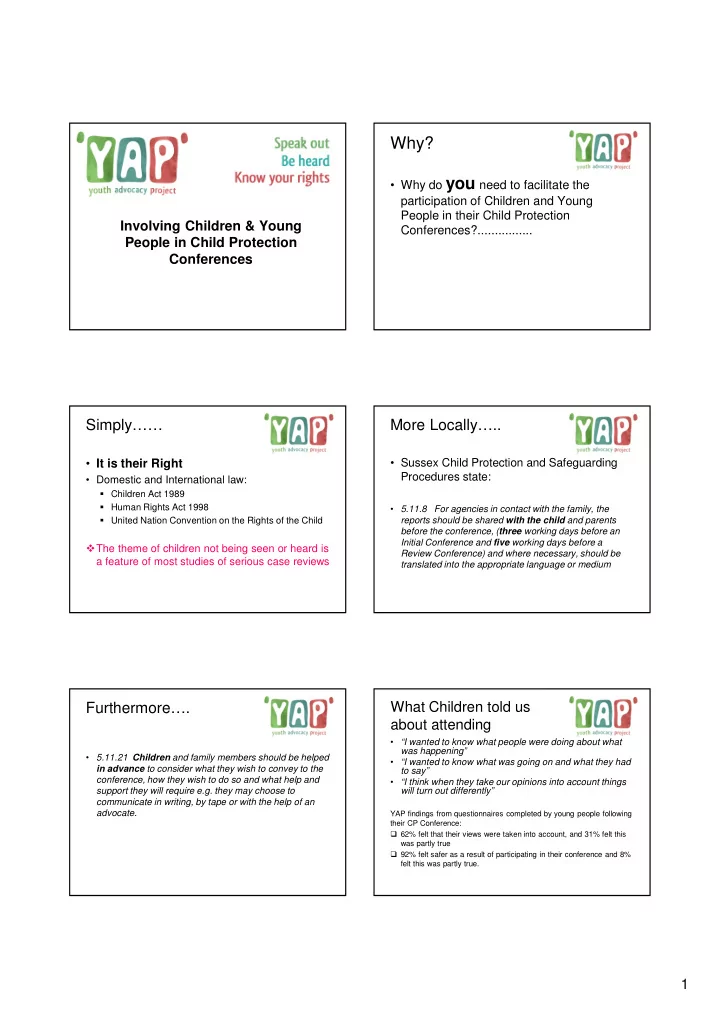

Why? • Why do you need to facilitate the participation of Children and Young People in their Child Protection Involving Children & Young Conferences?................ People in Child Protection Conferences Simply…… More Locally….. • It is their Right • Sussex Child Protection and Safeguarding Procedures state: • Domestic and International law: � Children Act 1989 � Human Rights Act 1998 • 5.11.8 For agencies in contact with the family, the � United Nation Convention on the Rights of the Child reports should be shared with the child and parents before the conference, ( three working days before an Initial Conference and five working days before a � The theme of children not being seen or heard is Review Conference) and where necessary, should be a feature of most studies of serious case reviews translated into the appropriate language or medium Furthermore…. What Children told us about attending • “I wanted to know what people were doing about what was happening” • 5.11.21 Children and family members should be helped • “I wanted to know what was going on and what they had in advance to consider what they wish to convey to the to say” conference, how they wish to do so and what help and • “I think when they take our opinions into account things support they will require e.g. they may choose to will turn out differently” communicate in writing, by tape or with the help of an advocate. YAP findings from questionnaires completed by young people following their CP Conference: � 62% felt that their views were taken into account, and 31% felt this was partly true � 92% felt safer as a result of participating in their conference and 8% felt this was partly true. 1
A more positive meeting & Those who didn’t attend.. a better outcome? • Conference Chair observes that she had never known a parent to respond negatively to views expressed by child in the conference. • “ It wasn't to do with me, it was to do with my • When positive information was shared, parents valued their strengths and achievements being recognised by mum and stuff” professionals • Decision making process more transparent, more interactive, more positive and less formal. • “Don't know, I didn't know about it until my mum • Facilitates parental engagement, by helping parents to told me after the meeting” be calmer and more receptive in meetings • Often parents don’t recognise the effect of their behaviour on their children. Children’s words are powerful and poignant. RKBC (2013) Why do children young Advocacy people need access to advocacy � • “They interpret your views to an adult in an adult way and tell me in a child’s way” • “Advocacy safeguards children and young people and protects them from abuse and poor practice” • “My advocate sits next to me, speaks for me, and Jacqui Smith, Minister of State, Department of Health, 2002 asks people questions for me” • “ They also spoke very highly of the support provided by voluntary sector advocacy services which they • “She can challenge things, because she knows what describe as critical in helping them to disclose should be happening and what I am entitled to” abuse and harm .” Eileen Munro, The Munro Review of Child Protection: Final Report – A • “I feel better, knowing I have someone on my side” child- centred system, May 2011 The Process How do Advocates work? • Young People 12+ should be invited to their conference. • We are led by the views and wishes of children and Advocacy should be explained and offered, and consent young people, we work exclusively for them. from parents sought • Advocate contacts young person, explains advocacy. • We adhere to high levels of confidentiality. • SW prepares YP friendly report and goes through with YP • Operate an Open Information policy • Advocate visits and goes through the report, working with • We champion the rights and needs of children and young person on their perspective, how they want to be involved in conference and what they have to contribute young people. • Advocate can attend with young person, or attend on their • We collate the views of the of children and young behalf, or send in a written statement. people in order to inform practice and policy in • YP presents/hears reports and gives their view. • SW to feedback outcome to child. Advocate visit to Children’s services. discuss outcome and feedback to SW if needed. • Offer Non-Instructed Advocacy to children with disabilities. 2
National Standards and Not just Social Workers Statutory Responsibility • All multi agency staff have a responsibility • National Standards for the Provision of Advocacy Services to Children and Young People DoH 2002 to ensure the maximum participation by • Provision of an advocate is a legal requirement for children and young people Children in Need or Children in Care who wish to make a complaint or a representation to the Local Authority • Make sure your reports are accessible to • Until recently, the framework for ascertaining a child’s young people. wishes during the child protection process was provided • Be clear and direct about your concerns by Working Together (WT) 2010 • Working Together 2013 advises SW’s & their managers • Share with young person before to help prepare the child if he/she is attending the conference. No surprises at conference. conference or making representations through a third party. 3
Recommend
More recommend